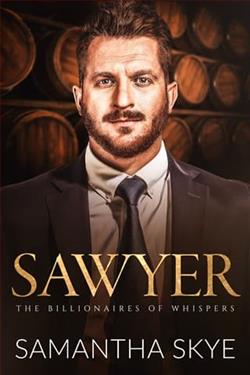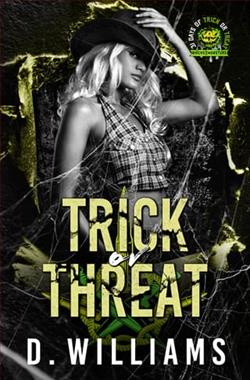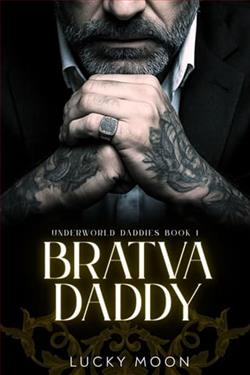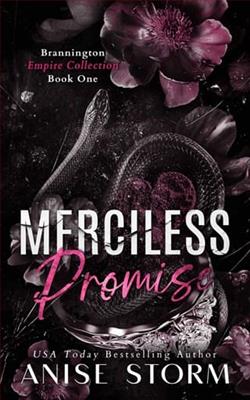Page 24 of Paranoia
Then we actually watched the show for a while. The chef had six young teens and tweens who looked to be middle schoolers or maybe freshmen in high school, and all of the contestants were from the New York City area. Each had a cutaway in which they talked about their lives and their interest in cooking. I found those stories much more compelling than the main part of the show.
A teenage girl from Yonkers said she just liked being in the kitchen. She couldn’t explain it. But a kid from the Bronx said that he saw cooking as his chance to get out of the cycle of crime and drugs many of the people in his neighborhood suffered from. I took this to heart. I’d heard many athletes say the same thing about football or boxing being their ticket out. I liked hearing kids talk about other avenues to pursue.
One thing I didn’t like was the way the chef talked to the kids. He made jokes at their expense, he raised his voice, and in one case he threw a young man’s garlic bread onto the floor because the boy hadn’t followed directions.
I sat up in bed and looked over to the crowd sitting on the floor. “Ricky, are you sure you want to put up with this kind of abuse? I think I like the English guy better.”
Ricky didn’t hesitate. “I think Mr. Carmelli can make me a better chef. If it’s what I really want to do in life, I need to see what it’s like in a big kitchen.”
Unfortunately, Ricky made perfect sense. Even I knew that professional kitchens weren’t the most calm and easygoing of places. The problem was, I had a feeling this TV chef was more interested in ratings than in actually helping any of the kids. But I wasn’t going to say anything. I didn’t want to dampen Ricky’s enthusiasm in any way.
I tried to lie back and enjoy having the family around me. Then I noticed my grandfather had dozed off in the recliner, blocking the doorway. That was going to be an issue when everyone had to go to bed.
CHAPTER 37
THE NEXT MORNING, I decided to go directly to the chief medical examiner’s office instead of my office. I knew my good friend Aurora Jones would be on duty. I’d left a message on her phone the previous night asking if she could conduct an autopsy on Roger Dzoriack.
Generally, the medical examiner’s office gave priority to violent crimes and other incidents that might require legal proceedings. Suicides were pretty far down on their list. Especially the suicide of a reclusive sixty-seven-year-old man.
I met Aurora in her office. Surprisingly, she’d already conducted the autopsy and an initial drug screen.
Aurora was eating a cherry yogurt with her feet up on her messy desk.
I sat down across from her, after moving a couple of files from the chair onto a credenza overflowing with medical journals andother files. I also tossed an old sandwich wrapper into the garbage can.
“Bennett, what are you doing on a suicide?” Aurora asked, her Jamaican accent making the question sound like the start of a joke. “Don’t you have enough to do?”
“You saw he was a retired cop.”
“A lot of retired cops commit suicide. I don’t usually have the city’s top homicide investigator leaving me a message asking me to look at it carefully.”
“Did you find anything of interest?”
She smiled. Aurora started speaking slowly, choosing her words carefully. “You are one of the few people I think could handle some of my insights. Because they are not all just from scientific review.”
“This isn’t a court hearing. You can say whatever you want, and it’ll stay between us. I doubt you could insult me.”
Aurora smiled again. The glasses hanging around her neck had sparkles glued to the frames. It matched her personality. “First of all, I called in a favor and had NYPD forensics take a sample of the water from the glass next to Mr. Dzoriack’s bed and run it through a spectrometer. There were four different prescription drugs crushed up in the water. I did some checking and found out Mr. Dzoriack had a prescription for only one of them. Ambien. I read in the report that no one found any other bottles of prescriptions in the apartment.”
I realized what she was saying and I saw where she was headed. If he never left his apartment, how did he get all the other pills? It was a good question.
I started to make notes. Perhaps we’d left the crime scene too early. I needed to look through Roger Dzoriack’s apartment again.
Aurora said, “Now I’m going to move out of my lane, as the kids say, and tell you something else I picked up from the forensics report.”
“I’m listening.”
“The glass by the side of the bed that had the water and crushed-up pills looks suspicious to me.”
“More than just because it held a deadly concoction of prescription drugs? How so?”
“There were only four fingers and one thumbprint on the glass.”
“Were they in a pattern as if he were holding a glass and drinking?”
“Yes, that’s exactly how they were placed. But those are theonlyprints on the glass. Are you telling me this man only held the glass one time, while he poured water and crushed pills into it? Did he really never set it down even once before he drank from it? Typically, you would pick up and put down a glass a few times. There should be dozens of sets of prints on it from all that handling. Yet this glass looked like it was wiped clean—except for a single set of Mr. Dzoriack’s fingerprints. It just doesn’t feel right to me.”
Aurora was onto something. The entire situation didn’t feel right. I had more work to do on the Roger Dzoriack investigation. That meant I had more work to do on this whole case.















